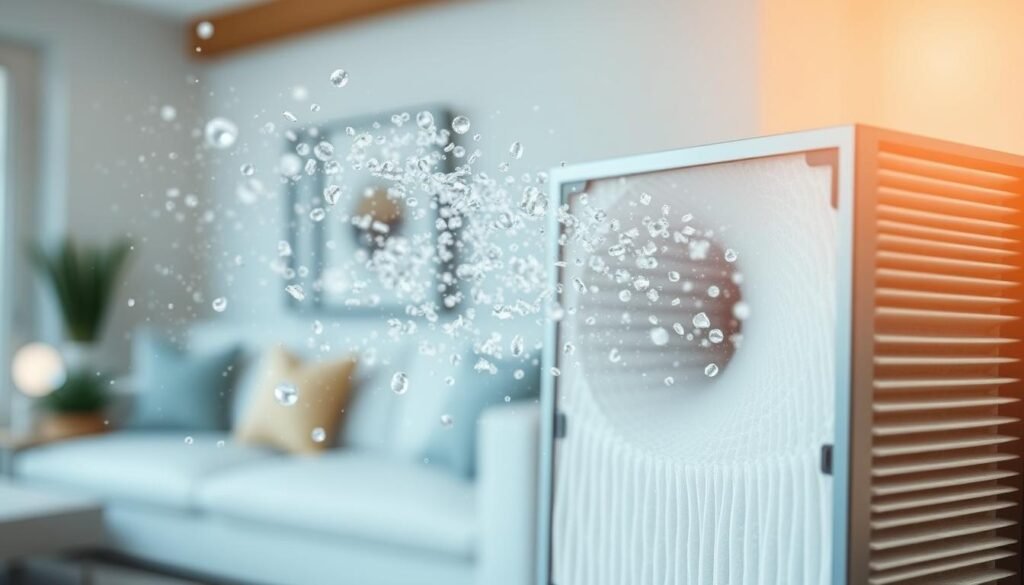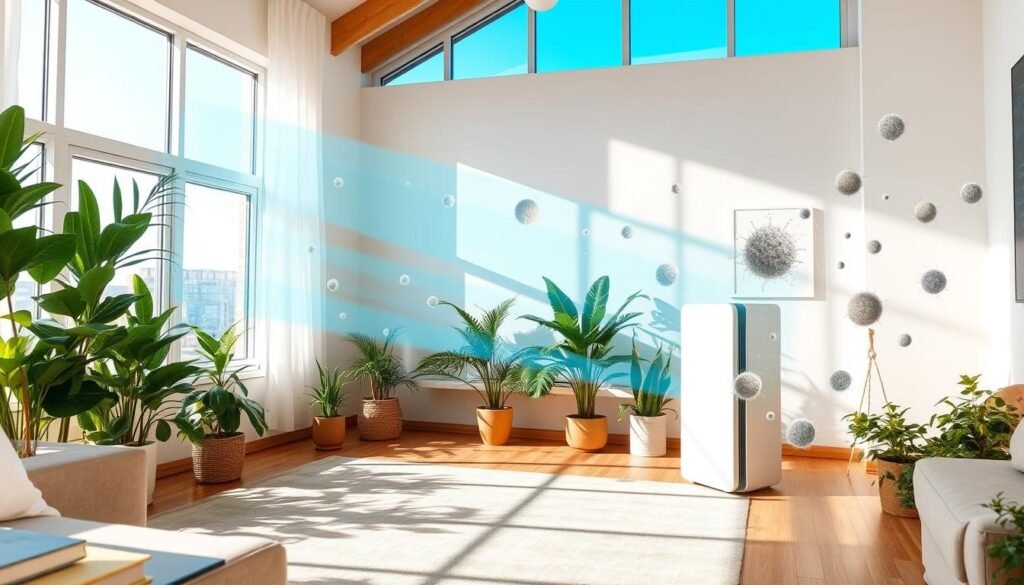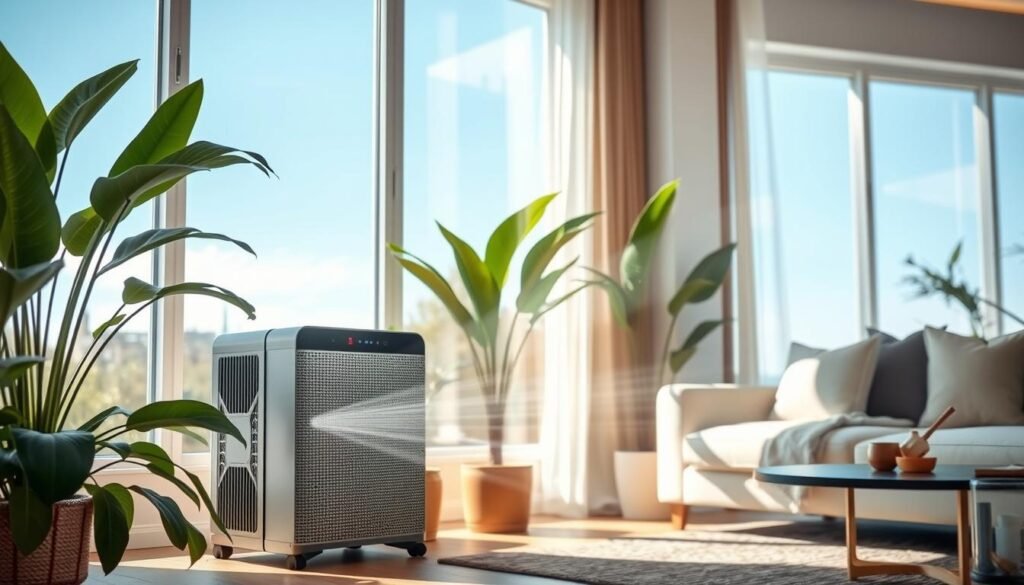Are you tired of stuffy, polluted air in your home, wondering if an air purifier is really worth the investment? The truth is, clean air can have a profound impact on our health and well-being, but do air purifiers deliver on their promises? In this article, we’ll dive deep into the science behind air purification and uncover whether these devices are a worthy addition to your home or merely a waste of money.
Key Takeaways
- Indoor air can be 2-5 times more polluted than outdoor air1
- Air purifiers help reduce harmful pollutants, eliminate toxic chemicals, and neutralize odors
- Clean air may boost life expectancy
- Air purifiers are most beneficial for those with asthma, allergies, and respiratory conditions
- Whole-home purification systems are more efficient than portable units1
Understanding Air Purification: The Science Behind Clean Air
Air purifiers are a popular solution for improving indoor air quality, but how exactly do they work? These devices use advanced air filtration technology to capture and remove various airborne pollutants, providing cleaner, healthier air for our homes and workspaces.
How Air Purifiers Work
At the core of an air purifier’s functionality is a fan that draws in air from the surrounding environment. This air is then passed through a series of filters, each designed to trap specific types of contaminants. The most common and effective filter type is the High-Efficiency Particulate Air (HEPA) filter, which can remove up to 99.97% of particles as small as 0.3 microns2. In addition to HEPA filters, some air purifiers also incorporate activated carbon filters to remove odors, gases, and volatile organic compounds (VOCs).
Types of Filtration Systems
Beyond the basic fan and filter setup, air purifiers may also utilize other technologies to enhance their performance. These include ultraviolet (UV) light, which can help kill bacteria and viruses, and ionizers, which can electrically charge particles, making them easier to capture. The effectiveness of an air purifier depends on factors such as the type of filtration system, the unit’s size, and its clean air delivery rate (CADR)2.
The Role of HEPA Filters
HEPA filters are considered the gold standard in air purification, and are widely used in healthcare settings and other critical environments. These filters are designed to capture an impressive 99.97% of particles as small as 0.3 microns, including fine particulate matter (PM2.5) and other airborne pollutants23. Proper maintenance, such as regular filter changes, is crucial for maintaining the optimal performance of any air purifier2.

By understanding the science behind air purification, consumers can make informed decisions about the best air filtration solutions for their specific needs and environments. Whether it’s removing allergens, reducing indoor air pollutants, or addressing respiratory concerns, air purifiers can play a vital role in improving indoor air quality and promoting overall health and well-being.
Are Air Purifiers a Waste of Money?
When it comes to air purifiers, the question of cost-effectiveness is a valid one. While air purifiers can be a significant investment, they are not necessarily a waste of money. In fact, they can play a crucial role in improving indoor air quality, especially for those with respiratory issues or allergies4.
The effectiveness of an air purifier depends on various factors, such as the size of the room, the quality of the filtration system, and the proper maintenance of the unit. Portable air purifiers may be less efficient than whole-home systems, as they can only clean the air in a limited space4.
However, air purifiers with advanced filtration technologies, such as HEPA filters, can be highly effective in removing a wide range of pollutants, including dust, pollen, mold, and even certain volatile organic compounds (VOCs)5. These filters are at least 99.7% effective in filtering microscopic particles as small as 0.3 microns, making them a valuable investment for improving indoor air quality5.
The cost of an air purifier can range from around $150 to $1,500, with good single-room units available for under $3006. While the initial investment may seem high, the long-term benefits of improved air quality and potential health advantages can make air purifiers a worthwhile investment4.
Ultimately, the decision to invest in an air purifier should be based on individual needs, budget, and the specific air quality concerns within the home. With careful research and consideration, air purifiers can be a cost-effective way to enhance indoor air quality and promote healthier living5.

“Air purifiers, when used with a better filter for the HVAC system, can greatly reduce the level of indoor air pollution.”5
- Air purifiers can be expensive to purchase, especially if they use advanced filtration technologies such as HEPA filters4.
- Some air purifiers require regular filter replacements, which can add to the overall cost4.
- Air purifiers may not be effective in removing certain pollutants such as volatile organic compounds (VOCs) or radon gas4.
- Some air purifiers may not cover a large enough area to effectively clean the air in a room, leading to the need for multiple units or a more powerful model4.
While there are potential drawbacks to consider, the benefits of using an air purifier can outweigh the costs for many households. By understanding the science behind air purification and the various filtration systems available, consumers can make an informed decision on whether an air purifier is a worthwhile investment for their indoor air quality needs5.
The Real Benefits of Air Purification Systems
Air purifiers can be a powerful tool in improving indoor air quality and providing a range of health benefits. From allergy relief to asthma management and reducing the impact of indoor air pollution, these devices can make a significant difference in creating a healthier living or working environment.
Health Advantages and Allergy Relief
One of the primary benefits of air purifiers is their ability to effectively remove common allergens like dust, pollen, and mold from the air7. HEPA filters used in air purifiers are at least 99.7% effective at filtering microscopic particles as tiny as 0.3 microns, including these common triggers7. By reducing the presence of these allergens, air purifiers can alleviate symptoms associated with allergies, such as sneezing, itchy eyes, and a runny nose.
Removing Indoor Air Pollutants
7 Air purifiers, when used in conjunction with an enhanced filter for HVAC systems, can significantly reduce the amount of indoor air pollution, according to the EPA7. These devices can effectively trap a variety of airborne contaminants, including volatile organic compounds (VOCs), pet dander, and smoke, contributing to a cleaner and healthier indoor environment.
Impact on Respiratory Conditions
7 An air purifier can eliminate some bacteria and viruses under specific airflow conditions, potentially helping to keep individuals healthier, especially during colder months7. However, it’s important to note that7 some air purifiers generate ozone, which can irritate lungs, leading the EPA to advise against using ozone air purifiers7. Choosing a purifier that does not produce ozone is crucial for those with respiratory conditions.
8 Whole-house air purifiers that filter the air throughout the home are recommended over single-room air purifiers for better indoor air quality control8. These whole-home systems can provide comprehensive filtration, ensuring a healthier living environment for individuals with asthma or other respiratory ailments.
9 HEPA filters are considered the gold standard for healthy air and are commonly used in healthcare settings such as hospitals9. Air purifiers with HEPA filtration can effectively capture a wide range of airborne particles, making them a valuable investment for those seeking to improve their indoor air quality and overall well-being.

“Investing in a high-quality air purifier can be a game-changer for individuals with respiratory issues or those seeking to create a healthier living or working environment.”
Portable vs. Whole-Home Air Purification Systems
When it comes to air purification, homeowners often face a choice between portable air cleaners and whole-house air purifiers. While portable units offer a convenient solution for individual rooms, they are often limited in their coverage and efficiency compared to whole-home systems10.
Whole-home air purifiers, on the other hand, are integrated into the HVAC system, providing comprehensive air filtration throughout the entire house. These systems can remove up to 100 times more carbon monoxide than portable units10, and their energy-efficient design can lead to reduced electricity bills by up to 30%10.
One of the key advantages of whole-home air purifiers is their ability to target a broader range of pollutants and allergens, including those that may be present in high-traffic areas or from outdoor sources10. This makes them particularly beneficial for homeowners living in areas with moderate to heavy traffic, where synthetic compounds can contribute to the formation of ground-level ozone10.
While the initial investment in a whole-home air purifier may be higher than a portable unit, the long-term cost savings and health benefits make it a worthwhile consideration11. Customers have praised the quality of service and the knowledge of the technicians, highlighting the value of professional installation and maintenance11.
Ultimately, the choice between portable and whole-home air purification systems depends on the specific needs and preferences of the homeowner. For larger homes or those with more complex indoor air quality concerns, a whole-home system may be the optimal solution to ensure consistent and comprehensive air filtration11.
To determine the best air purification strategy for your home, it’s recommended to schedule an assessment with a trusted HVAC provider like Minuteman Heating & Air11. They can evaluate your specific needs and guide you towards the most effective and energy-efficient solution to improve your indoor air quality and overall living conditions11.
Conclusion
In conclusion, air purifiers are a worthwhile investment for improving indoor air quality and enhancing overall health and well-being12. They are particularly beneficial for individuals with respiratory issues, allergies, or those living in areas with poor air quality13. While not a complete solution, air purifiers can significantly reduce indoor air pollutants when used in combination with proper ventilation and cleaning practices12.
The choice between portable and whole-home air purification systems depends on individual needs and budget12. Factors such as room size, noise level, maintenance and filter replacement costs, energy consumption, and overall price should be considered when selecting an air purifier12. Investing in an air purifier, like the AlorAir Scrubber, is a smart choice for improving indoor air quality improvement and providing clean air solutions for your home12.
Ultimately, air purifiers are a worthwhile air purifier investment that can deliver significant benefits in terms of reducing allergens, improving respiratory health, and enhancing overall indoor air quality13. Regular maintenance and proper usage are key to maximizing the benefits of these air cleaning devices and ensuring they continue to provide a healthier living environment14.
FAQ
What is the state of indoor air quality compared to outdoor air?
Indoor air is 2-5 times more polluted than outdoor air. Air purifiers help reduce harmful pollutants, eliminate toxic chemicals, and neutralize odors.
How can clean air boost life expectancy?
Clean air may boost life expectancy, as improved indoor air quality can have a positive impact on overall health and well-being.
What is the growth projection for the US air purifier market?
The US air purifier market is expected to grow from .8 billion in 2022 to .78 billion by 2030.
Who benefits the most from using air purifiers?
Air purifiers are most beneficial for people with asthma, allergies, cardiovascular issues, children, pregnant women, and the elderly.
When is an air purifier essential for everyone?
Air purifiers become essential for everyone when the air quality index reaches 150 or higher.
How do air purifiers work?
Air purifiers use a fan to draw in air and pass it through filters. HEPA filters remove 99% of particles as small as 0.3 microns, while carbon filters remove odors, gases, and VOCs. Some devices include UV light or ionizers.
What factors determine the effectiveness of air purifiers?
Effectiveness depends on filtration type, unit size, and clean air delivery rate (CADR). HEPA filters are the gold standard, used in healthcare settings. Proper maintenance and regular filter changes are crucial for optimal performance.
Are air purifiers a waste of money?
Air purifiers are not a waste of money if used correctly. They can significantly improve indoor air quality, especially for those with respiratory issues or allergies. However, effectiveness depends on factors like room size, filter quality, and maintenance.
What is the cost range for air purifiers?
Costs range from 0 to
FAQ
What is the state of indoor air quality compared to outdoor air?
Indoor air is 2-5 times more polluted than outdoor air. Air purifiers help reduce harmful pollutants, eliminate toxic chemicals, and neutralize odors.
How can clean air boost life expectancy?
Clean air may boost life expectancy, as improved indoor air quality can have a positive impact on overall health and well-being.
What is the growth projection for the US air purifier market?
The US air purifier market is expected to grow from $2.8 billion in 2022 to $4.78 billion by 2030.
Who benefits the most from using air purifiers?
Air purifiers are most beneficial for people with asthma, allergies, cardiovascular issues, children, pregnant women, and the elderly.
When is an air purifier essential for everyone?
Air purifiers become essential for everyone when the air quality index reaches 150 or higher.
How do air purifiers work?
Air purifiers use a fan to draw in air and pass it through filters. HEPA filters remove 99% of particles as small as 0.3 microns, while carbon filters remove odors, gases, and VOCs. Some devices include UV light or ionizers.
What factors determine the effectiveness of air purifiers?
Effectiveness depends on filtration type, unit size, and clean air delivery rate (CADR). HEPA filters are the gold standard, used in healthcare settings. Proper maintenance and regular filter changes are crucial for optimal performance.
Are air purifiers a waste of money?
Air purifiers are not a waste of money if used correctly. They can significantly improve indoor air quality, especially for those with respiratory issues or allergies. However, effectiveness depends on factors like room size, filter quality, and maintenance.
What is the cost range for air purifiers?
Costs range from $150 to $1,500, with good single-room units available for under $300.
What are the health benefits of using air purifiers?
Air purifiers can reduce allergy and asthma triggers like dust, pollen, mold, and VOCs. They alleviate symptoms related to poor indoor air quality such as dry throat, headaches, fatigue, and dizziness. Some models can inactivate certain bacteria and viruses, potentially reducing the risk of illness.
How do portable and whole-home air purifiers differ?
Portable air purifiers are limited in coverage and efficiency compared to whole-home systems. Whole-home purifiers are installed in HVAC systems and clean air throughout the entire house. Portable units require proper placement and frequent maintenance, while whole-home systems offer more comprehensive coverage but may be more expensive initially.
,500, with good single-room units available for under 0.
What are the health benefits of using air purifiers?
Air purifiers can reduce allergy and asthma triggers like dust, pollen, mold, and VOCs. They alleviate symptoms related to poor indoor air quality such as dry throat, headaches, fatigue, and dizziness. Some models can inactivate certain bacteria and viruses, potentially reducing the risk of illness.
How do portable and whole-home air purifiers differ?
Portable air purifiers are limited in coverage and efficiency compared to whole-home systems. Whole-home purifiers are installed in HVAC systems and clean air throughout the entire house. Portable units require proper placement and frequent maintenance, while whole-home systems offer more comprehensive coverage but may be more expensive initially.

